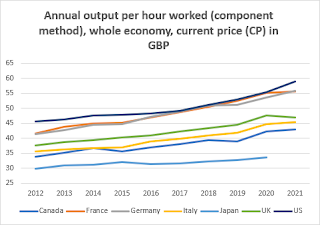'Did you know the time of the week that the average British worker is most miserable? When He's meeting with his manager!' As Professor Lord Layard said this, the entire audience laughed. This is from his research from his latest book, 'Can we be happier?'.
Last night, I attended a great lecture with Professor Lord Layard, the happiness expert at the LSE, where I was an undergraduate Law Student.
Below: Dame Minouche Shafik and Professor Lord Layard
Lord Layard started by talking about the foundation of the LSE, by Beatrice and Sydney Webb, Fabians, who believed in the importance of improving society. William Beveridge, who set up the modern welfare state in the UK, was a Director
of the LSE and was also profoundly concerned about the happiness of society.
Then Lord Layard talked about how society seemed to be getting less happy. This is confirmed by looking at life expectancy, which is now going down for the first time in recorded memory in the USA and to some extent in the UK. I believe that Coronavirus will accelerate this trend.
As Society has become more selfish, individualistic and competitive, according to Lord Layard, unfortunately, we have created a happiness 'Zero-sum game'. Each time I 'go up', someone else must inevitably also 'go down'.
How can that philosophy of one-upmanship that many live with create happiness across society? Perhaps that's why, despite all our improvements in material circumstances, we, as a society, are more miserable than ever before.
Professor Lord Layard mentioned that the best way to determine an old person's life expectancy is not their doctor's 'physical' exam, but simply asking the patient 'are you happy?'.
Professor Lord Layard mentioned that the best way to determine an old person's life expectancy is not their doctor's 'physical' exam, but simply asking the patient 'are you happy?'.
We put together a stimulating group for drinks and dinner after the event. This included a school
teacher, Polly, and her husband, Ben, a software programmer, who works for Google's Deep Mind. My old school friend Lucas, studied PPE at Oxford University.
Lucas was the smartest pupil at my school - he got the second-highest first-class degree in his year, studying Politics. Philosophy. Economics at Oxford (this was back in the days when very few students attained a first-class degree). Then he took a PhD at the University of Pennsylvania. He is now a Professor of Philosophy at Bogazici University, in Istanbul, Turkey.
Lucas brought along a close friend from Oxford University, Tara, a management consultant. I also invited Steve, who studied at Oxford and is a Doctor and Professor of medicine. We had a wide-ranging discussion about happiness. Some of the topics we covered.
Steve said he preferred the word eudaimonia —Aristotle's concept of flourishing—rather than happiness, which seemed to be more based on luck (Eutuxes) than living a good life.
Tara said that certain people, 'Eeyores' are always going to
be miserable, and others will usually be happy. Then, Lucas, Polly and Steve discussed how bad
the education system had become in the UK.
They all agreed that the institutions' constant performance monitoring was sucking the life out of any innovation. You can read more about this here - Moonshot thinking to unleash innovation.
They all agreed that the institutions' constant performance monitoring was sucking the life out of any innovation. You can read more about this here - Moonshot thinking to unleash innovation.
Go to my website.






